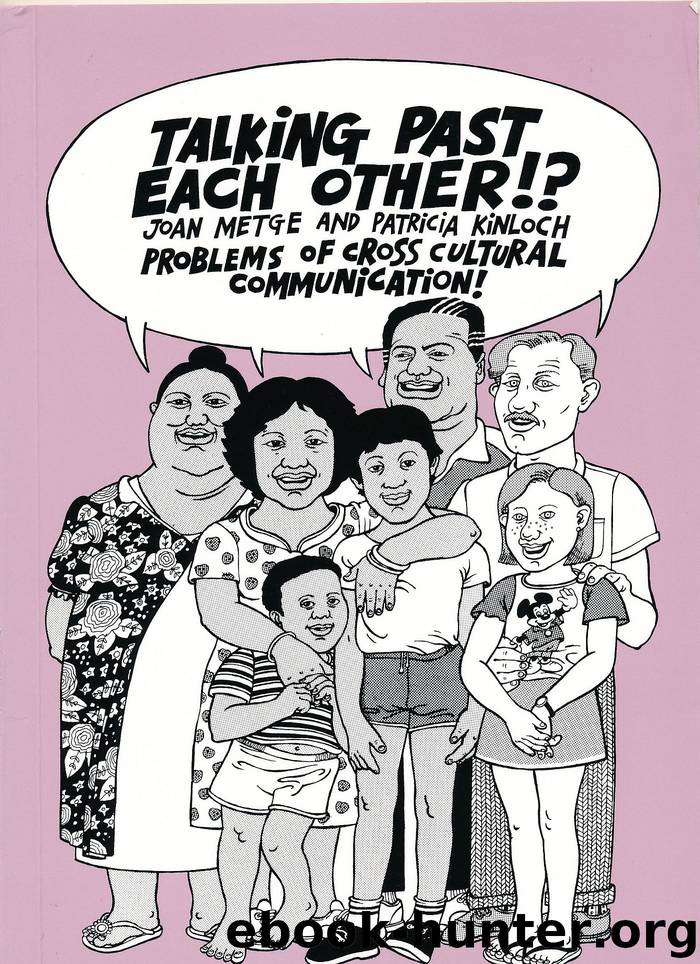Talking Past Each Other by Patricia Kinloch

Author:Patricia Kinloch [Joan Metge and Patricia Kinloch]
Language: eng
Format: epub
ISBN: 978-0-86-473734-2
Publisher: Independent Publishers Group
Published: 2011-03-06T16:00:00+00:00
THE DEFINITION OF ‘FAMILY’, ‘PARENT’ AND ‘CHILD’
The word ‘family’ has a wide range of meaning, but when Pakehas talk of ‘the family’ and ‘family life’ without qualification they almost invariably mean the small family of parents and children. They think of other kinds of family as secondary and derivative, made up by adding small families together. To Maoris and Samoans on the other hand ‘the family’ normally means the large-family of kinsfolk, of which the small-family is a sub-division. This difference of emphasis goes with differences in the definition of the parent-child relation.
Pakehas limit the use of ‘parent’, ‘father’ and ‘mother’ to those from whom a ‘child’ (whether ‘son’ or ‘daughter’) is directly descended by birth or adoption: in technical terms, to lineal relatives of the first ascending generation. In the normal course of events a child has only one father and one mother; fostering and second marriages create what are seen as anomalies. What is more important than the terms, Pakehas see the relationship of parent to child as exclusive, with both the rights and responsibilities of parenthood focused almost entirely on ‘father’ and ‘mother’, so that others hesitate to intervene even when things go obviously wrong. Parents may be taken to task by their own parents for their handling of their immature children, but it is generally understood that they are under no obligation to heed such strictures: their rights as parents are stronger than their own filial duty.
In contrast the traditional Maori and Samoan kinship terminologies are both of the Classificatory type, that is, they make no distinction between lineal and collateral relatives. In Maori an individual uses matua for all male relatives in his or her parents’ generation and whaea for all female relatives in his or her parents’ generation.16 The Samoan system is similar if more complicated. A Samoan of either sex uses the word tina for his mother and those of his mother’s sisters and father’s sisters who are close to her in age and tama for his father and those of his father’s brothers and mother’s brothers close to his father in age.17 When speaking of aunts and uncles younger than they are however, Samoans classify them with their brothers and sisters.18 There are of course ways of distinguishing one’s ‘own’ father and mother from one’s ‘other’ fathers and mothers by the addition of modifiers.
In English, Maoris and Samoans use the English terms ‘father’, ‘mother’, ‘uncle’ and ‘aunt’, but they sit much more lightly to the idea that a person only has one ‘mother’ and ‘father’ than Pakehas, and apply ‘uncle’ and ‘aunt’ to parents’ cousins as well as siblings. Children who live for any length of time with grandparents or uncles and aunts (as many do) commonly address them by one form of the terms for ‘father’ and ‘mother’ while using another for their ‘real’ parents. Regardless of terminology, Maoris and Samoans take a less exclusive view of the parent-child relation. They think of children as belonging not only to their parents but also to the wider kin group and, in the case of Samoans, to the village community.
Download
This site does not store any files on its server. We only index and link to content provided by other sites. Please contact the content providers to delete copyright contents if any and email us, we'll remove relevant links or contents immediately.
| Anthropology | Archaeology |
| Philosophy | Politics & Government |
| Social Sciences | Sociology |
| Women's Studies |
Nothing to Envy by Barbara Demick(1443)
The Pub by Pete Brown(1294)
On Sparta (Penguin Classics) by Plutarch(1188)
Transcendence by Gaia Vince(1139)
The Perfumes The A-Z Guide by Luca Turin(1131)
Albion by Peter Ackroyd(1067)
Mysteries of the Middle Ages by Thomas Cahill(1041)
A short history of nearly everything by Bill Bryson(1028)
100 Techniques by Unknown(1010)
2120-2126 by Russell Fine(941)
2024-2120 by Russell Fine(928)
Natasha's Dance by Orlando Figes(924)
The Wedge by Scott Carney(896)
How the Irish Saved Civilization by Thomas Cahill(890)
The Lost Continent by Bill Bryson(865)
Angela's Ashes by Frank Mccourt(860)
Ancient Iraq by Georges Roux(859)
The Way of the Shaman by Harner Michael(853)
The World Until Yesterday: What Can We Learn From Traditional Societies? by Jared Diamond(846)
